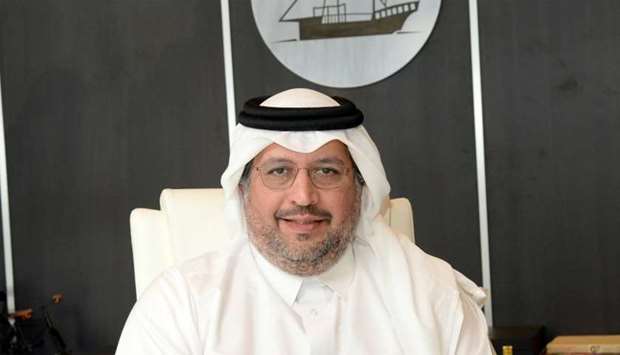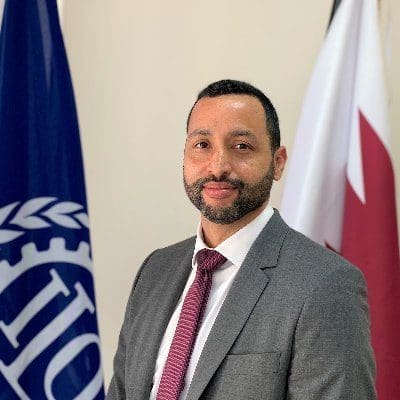World Cup 2022:
How Is the Media Shaping Migrant Rights Issues in Qatar?
November 15, 2022
Summary
The Middle East Council on Global Affairs (ME Council) hosted a webinar on November 15, 2022, examining the media’s impact on migrant rights issues in Qatar in the lead-up to the 2022 FIFA World Cup. The Council gathered a panel of media and labor experts who offered their insights on foreign and local media coverage of the tournament, Qatar’s recent labor reforms, and the question of the reforms’ durability after the World Cup. Marc Owen Jones, non-resident senior fellow at the Council, moderated the discussion. The distinguished panelists included Vani Saraswathi, director of projects and editor-at-large of Migrant-Rights.org; Faisal Al-Mudahka, editor-in-chief of the Gulf Times; and Max Tuñón, head of the International Labour Organization (ILO) Project Office for the State of Qatar.
Jones started the webinar by highlighting the intense international scrutiny that Qatar has faced regarding its labor policies since 2010, when the country won the bid to host the 2022 FIFA World Cup. Major media outlets have called on both Qatar and FIFA to better safeguard migrant worker welfare. Over the past decade, Qatar has enacted a series of significant reforms and established a cooperation programme with the ILO in 2018, placing it at the forefront of regional efforts to improve the lives of migrant workers. Yet, despite these efforts, international organizations continue to mount criticism of the reforms’ implementation and question their durability after the World Cup. From within the country, citizens have expressed concern about media misinformation and portrayals that hold Qatar to a different standard than previous World Cup hosts. Jones then posed the first question to the panelists, asking how Qatar has responded to international media critiques and concerns about migrant rights.
Faisal Al-Mudahka noted the double-standard of media coverage that criticizes Qatar for the abuses perpetrated by contracting companies that profit most from such exploitative practices. Other countries, such as the United States, he stressed, do not face the same level of criticism for the harmful practices of companies like Nike and Amazon. In his view, criticism would be better directed towards private companies—many of them based in Europe—rather than primarily towards the Qatari government. He underscored that the government has introduced several significant policy reforms over the past decade, a process accelerated by the World Cup, and Qatar is rapidly adapting to face the unprecedented challenges of its mega-projects. He also clarified that the frequently cited figure of 6,500 World Cup-related deaths is actually the figure for all expatriate deaths in Qatar over the past decade. Given that 85-90% of Qatar’s population is comprised of non-citizens, this figure represents a death rate far lower than the rates in Western countries.
Vani Saraswathi responded by bringing attention to the decline of local, independent media in Qatar. Most reporters are non-Qatari residents and tend to self-censor, fearing deportation or loss of employment. Qatari business owners often sit on the board of local newspapers, which can intimidate reporters and lead to either self-censor or face backlash. Qatar has failed to recognize the advantages of an independent media that would not be seen merely as a PR channel for the government. Saraswathi agreed with Al-Mudahka that businesses must be held more accountable. However, this is not solely the responsibility of the media, as most businesses—particularly those working on World Cup-related projects—benefit from government contracts. Thus, the government has an important role to play in choosing ethical contractors and monitoring to ensure that companies comply with labor laws.
Max Tuñón added that it is important to not generalize, as there are different types of media coverage. However, he argued that there is a definite bias against Qatar in certain international media coverage. Tuñón also mentioned that many journalists continue to circulate the 6,500 figures without giving it adequate context. While the ILO has pointed out why this number might be misleading, it still has a significant impact on perceptions of Qatar and the World Cup. For instance, in a recent meeting with European Parliament members that Tuñón attended, he observed policymakers citing the figure.
Jones then pivoted the discussion to the issues that remain and are needed to fully implement the reforms and effectively track the outcomes and impacts on workers’ lives. Tuñón replied by stating that there needs to be enhanced interaction with the ILO and trade unions in the country. Not all workers are benefitting from the Kafala reforms, as the threat of deportation and identity card cancellation remains an issue. There is a significant show of good intentions from the government, but huge implementation gaps remain. For example, workers have filed numerous complaints about months-late or unpaid wages and lack of time off. Tuñón concluded by stressing that the labor reforms are in line with Qatar’s National Vision 2030, and more efficient implementation will help to effectively fulfill this vision. Saraswathi added that workers also must be made more aware of their rights, to combat the culture of fear about filing complaints and speaking up about abuses. Beyond legal protections, social attitudes must evolve and there needs to be increased buy-in from businesses and civil society to the laws.
Lastly, Jones concluded by asking the panelists to evaluate the durability of Qatar’s labor reforms after international scrutiny wanes post-World Cup, and as the country reevaluates its priorities. Saraswathi asserted the importance of monitoring reform implementation after the World Cup. There is a fear that as the international media moves on, incentives will decrease for the government to follow through on implementation. Al-Mudahka agreed with Saraswathi on the need to involve businesses in discussions of the reforms, as they need time and support to implement changes to their business practices. International media, he emphasized, has not adequately reported on the changes and implementation efforts already made. The government has banned companies that violated the laws from doing business and imprisoned contractors for failing to pay wages, but this has not been reported widely. Tuñón agreed, contending that the Kafala reforms, the establishment of joint committees of elected representatives among migrant workers, and the recent strengthening of the country’s heat stress legislation are all underreported in international media.
Speakers

Faisal Al-Mudahka
Editor in Chief, Gulf Times

Vani Saraswathi
Director of Projects & Editor-at-Large, MigrantRights.org


